General Arnold was at the mansion of Colonel Robinson (Beverly
House) on the morning of the 24th of September, 1780, fully persuaded that
his treasonable plans for surrendering West Point and its dependencies into
the hands of Sir Henry Clinton, the British commander-in-chief,-- then in
possession of New York,--for the consideration of a brigadier's commission
in the British army, and £10,000 in gold, were working prosperously.
This subject we shall consider more in detail hereafter. We will only notice,
in this connection, events that occurred at the Beverly House.
Major André, Arnold's immediate accomplice in treasonable,
designs, had, in a personal interview, arranged the details of the wicked
bargain, and left for New York. Arnold believed he had arrived there in safety,
with all requisite information for Sir Henry; and that before Washington's
return from Connecticut, whither he had gone to hold a conference with Rochambeau
and other French officers, Clinton would have sailed up the Hudson and taken
possession of the Highland fortresses. But André did not reach New
York. He was captured on his way, by militia-men, as a suspicious-looking
traveler. Evidences of his character as a spy were found upon his person,
and he was detained. Washington returned sooner than Arnold expected him.
To the surprise of the traitor, Hamilton and Lafayette reached the Beverly
House early on the morning of the 24th, and announced that Washington had
turned down to the West Point Ferry, and would be with them soon. At breakfast
Arnold received a letter from an officer below, saying, "Major André,
of the British Army, is a prisoner in my custody." The traitor had reason
to expect that evidences of his own guilt might arrive at any moment. He concealed
his emotions. With perfect coolness he ordered a horse to be made ready, alleging
that his presence was needed "over the river" immediately, He then
left the table, went into the great passage, and hurried up the broad staircase
to his wife's chamber. In brief and hurried words he told her that they must
instantly part, perhaps for ever, for his life depended on his reaching the
enemy's lines without detection. Horror-stricken, the poor young creature,
but one year a mother, and not two a wife, swooned and sank senseless upon
the floor. Arnold dare not call for assistance, but kissing, with lips blasted
by words of guilt and treason, his boy, then sleeping in 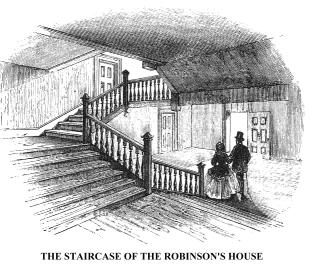 angel
innocence and purity, he rushed from the room, mounted a horse, hastened to
the river, flung himself into his barge, and directing the six oarsmen to
row swiftly down the Hudson, escaped to the Vulture, a British sloop-of-war,
lying far below.
angel
innocence and purity, he rushed from the room, mounted a horse, hastened to
the river, flung himself into his barge, and directing the six oarsmen to
row swiftly down the Hudson, escaped to the Vulture, a British sloop-of-war,
lying far below.
Washington arrived at the Beverly House soon after Arnold left
it. As yet no suspicion of treason had entered his mind. After a hasty breakfast,
he crossed to West Point, expecting to find Arnold there. "I have heard
nothing from him for two days," said Colonel Lamb, the commanding officer.
Washington's suspicions were awakened. He soon re-crossed the river, where
he was met by Hamilton with papers just received revealing Arnold's guilt.
He called in Knox and Lafayette for counsel. "Whom 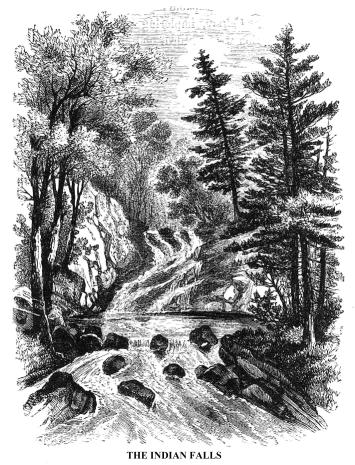 can
we trust now?" he inquired with calmness, while deep sorrow evidently
stirred his bosom. At the same time the condition of Mrs. Arnold, who was
frantic with grief and apprehension, awakened his liveliest sympathies. "The
general went up to see her," wrote Hamilton in describing the scene.
"She upbraided him with being in a plot to murder her child, for she
was quite beside herself. One moment she raved; another she melted into tears.
Sometimes she pressed her infant to her bosom, and lamented its fate, occasioned
by the imprudence of its father, in a manner that would have moved insensibility
itself." Washington believed her innocent of all previous knowledge of
her husband's guilt, and did all in his power to soothe her. "She is
as good and innocent as an angel, and as incapable of doing wrong," Arnold
wrote to Washington, from the Vulture, imploring protection for his wife and
child. Ample protection was afforded, and Mrs. Arnold and her infant were
conveyed in safety to her friends. She was the traitor's second wife, and
the daughter of Mr. Shippen, a loyalist of Philadelphia; and she was only
eighteen years of age at the time of her marriage to Arnold, while he was
military governor of that city, in 1778. The child above-mentioned was named
can
we trust now?" he inquired with calmness, while deep sorrow evidently
stirred his bosom. At the same time the condition of Mrs. Arnold, who was
frantic with grief and apprehension, awakened his liveliest sympathies. "The
general went up to see her," wrote Hamilton in describing the scene.
"She upbraided him with being in a plot to murder her child, for she
was quite beside herself. One moment she raved; another she melted into tears.
Sometimes she pressed her infant to her bosom, and lamented its fate, occasioned
by the imprudence of its father, in a manner that would have moved insensibility
itself." Washington believed her innocent of all previous knowledge of
her husband's guilt, and did all in his power to soothe her. "She is
as good and innocent as an angel, and as incapable of doing wrong," Arnold
wrote to Washington, from the Vulture, imploring protection for his wife and
child. Ample protection was afforded, and Mrs. Arnold and her infant were
conveyed in safety to her friends. She was the traitor's second wife, and
the daughter of Mr. Shippen, a loyalist of Philadelphia; and she was only
eighteen years of age at the time of her marriage to Arnold, while he was
military governor of that city, in 1778. The child above-mentioned was named
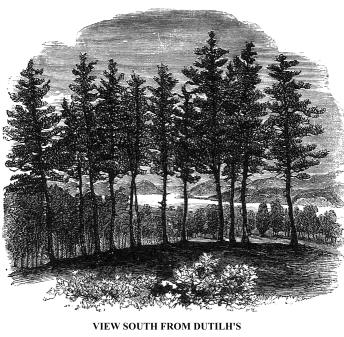 James Robertson
Arnold. He entered the British army, and rose to the rank of Colonel of Engineers.
He was at one time the aide-de-camp of her Majesty. In 1841 he was transferred
from the Engineers' corps, and in 1846 was a major-general and a Knight of
the Royal Hanoverian Guelphic Order.
James Robertson
Arnold. He entered the British army, and rose to the rank of Colonel of Engineers.
He was at one time the aide-de-camp of her Majesty. In 1841 he was transferred
from the Engineers' corps, and in 1846 was a major-general and a Knight of
the Royal Hanoverian Guelphic Order.
Mr. Arden kindly took us in his carriage from Beverly to Indian
Brook, a clear mountain stream that makes its way in rapids and cascades,
through a wild ravine, from the hills to the river. It falls into the deep
marshy bay between Garrison's and Cold Spring. We stopped on the way to view
the river and mountains below West Point, from the residence of Eugene Dutihl,
Esq. His mansion is upon a point of the plain, shaded by a grove of pines,
overlooking a deep dark dell, with a sparkling brook in its bosom, on one
side, and the river and grand mountain scenery on the other. The view southward
from his piazza is one of the most interesting and beautiful (though not the
most extensive) among the Highlands, comprehending the site of Forts Clinton
and Montgomery-- the theatre of stirring and most important events in the
war for independence. From thence we passed along the brow of the declivity
next the river, to the mansion of Ardenia, from which one of the finest views
of West Point may be obtained; and then rode to Indian Brook, passing, on
the way, the ancient Philipsburg Church--in which the officers of the Continental
Army had worshipped during the Revolution--and the grounds and mansions of
wealthy residents in that vicinity.
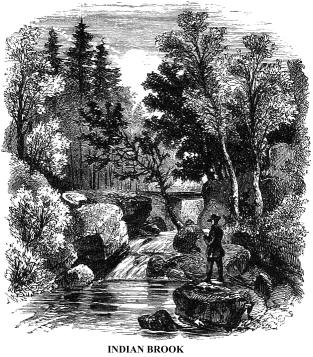
We crossed Indian Brook on a rustic bridge, just below the
Indian Falls, whose murmur fell upon the ear before we came in sight of the
stream. These falls have formed subjects for painting and poetry, and are
the delight of the neighbourhood in summer. In the small space allotted for
each of our illustrations and accompanying descriptions, we can convey only
faint ideas of the wild beauty of the scenes we are called upon to depict
in this mountain region of the Hudson. We were on the Indian Brook on a bright
October day, when the foliage was in its greatest autumnal splendour, and
the leaves were falling in gentle showers among the trees, the rocks, and
in the sparkling water, appearing like fragments of rainbows cast, with lavish
hand, into the lap of earth. At every turn of the brook, from its springs
to its union with the Hudson, a pleasant subject for the painter's pencil
is presented. Just below the bridge, where the highway crosses, is one of
the most charming of these "bits." There, in the narrow ravine,
over which the tree tops intertwine, huge rocks are piled, some of them covered
with feathery fern, others with soft green mosses, and others as bare and
angular as if just broken from some huge mass, and cast in there by Titan
hands. In midsummer this stream is still more attractive, for there, as Street
has sung of the Willewemoe,--
In the neighbourhood of this mountain stream are delightful
summer residences, fitted for occupation all the year round. Among the most
pleasing of these, in their relation to the surrounding scenery, are those
of Dr. Moore, late President of Columbia College, and Mr. De Rham, a retired
merchant. We passed through their grounds on our way to Cold Spring village,
and wished for space, among our sketches of the Highland scenery, for pen
and pencil pictures of charming spots upon these and the neighbouring estates.
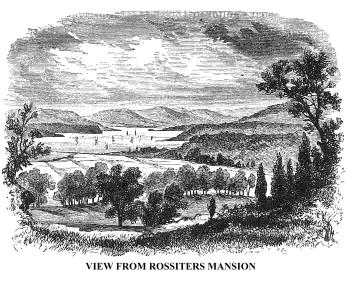 Our
road to Cold Spring lay through the region occupied by portions of the American
army at different times during the old war for independence. There, in the
spring of 1781, the troops and others stationed there were inoculated with
the small-pox. "All the soldiers, with the women and children,"
wrote Dr. Thacher, an army surgeon, "who have not had the small-pox,
are now under inoculation." "Of five hundred who were inoculated
here," he wrote subsequently, "only four have died." This was
about fifteen years before Jenner made successful experiments in vaccination.
Our
road to Cold Spring lay through the region occupied by portions of the American
army at different times during the old war for independence. There, in the
spring of 1781, the troops and others stationed there were inoculated with
the small-pox. "All the soldiers, with the women and children,"
wrote Dr. Thacher, an army surgeon, "who have not had the small-pox,
are now under inoculation." "Of five hundred who were inoculated
here," he wrote subsequently, "only four have died." This was
about fifteen years before Jenner made successful experiments in vaccination.
This portion of the Highlands is a charming region for the
tourist on the Hudson; and the lover of nature, in her aspects of romantic
beauty and quiet majesty, should never pass it by.
CHAPTER XIII, Part TWO
Copyright
© 1998, -- 2004.
Berry Enterprises. All rights reserved. All
items on the site are copyrighted. While
we welcome you to use the information provided on this web site by copying
it, or downloading it; this information is copyrighted
and not to be reproduced
for distribution, sale, or profit.
 t
was mid-autumn when we visited Beverly House, and the Sugar-Loaf Mountain,
at the foot of which it stands, exhibited those gorgeous hues which give such
unequalled splendour to American forests at that season of the year. The beautiful
hues of the foliage of the maple, hickory, chestnut, birch, sassafras, and
several other kinds of deciduous trees in the Northern and Middle States,
seen just before the falling of the leaf in autumn, are almost unknown in
Europe. A picture by Cropsey, one of the most eminent of living American landscape
painters, in which this peculiarity of foliage was represented, drew from
one of the minor English poets the following sonnet:--
t
was mid-autumn when we visited Beverly House, and the Sugar-Loaf Mountain,
at the foot of which it stands, exhibited those gorgeous hues which give such
unequalled splendour to American forests at that season of the year. The beautiful
hues of the foliage of the maple, hickory, chestnut, birch, sassafras, and
several other kinds of deciduous trees in the Northern and Middle States,
seen just before the falling of the leaf in autumn, are almost unknown in
Europe. A picture by Cropsey, one of the most eminent of living American landscape
painters, in which this peculiarity of foliage was represented, drew from
one of the minor English poets the following sonnet:-- angel
innocence and purity, he rushed from the room, mounted a horse, hastened to
the river, flung himself into his barge, and directing the six oarsmen to
row swiftly down the Hudson, escaped to the Vulture, a British sloop-of-war,
lying far below.
angel
innocence and purity, he rushed from the room, mounted a horse, hastened to
the river, flung himself into his barge, and directing the six oarsmen to
row swiftly down the Hudson, escaped to the Vulture, a British sloop-of-war,
lying far below. can
we trust now?" he inquired with calmness, while deep sorrow evidently
stirred his bosom. At the same time the condition of Mrs. Arnold, who was
frantic with grief and apprehension, awakened his liveliest sympathies. "The
general went up to see her," wrote Hamilton in describing the scene.
"She upbraided him with being in a plot to murder her child, for she
was quite beside herself. One moment she raved; another she melted into tears.
Sometimes she pressed her infant to her bosom, and lamented its fate, occasioned
by the imprudence of its father, in a manner that would have moved insensibility
itself." Washington believed her innocent of all previous knowledge of
her husband's guilt, and did all in his power to soothe her. "She is
as good and innocent as an angel, and as incapable of doing wrong," Arnold
wrote to Washington, from the Vulture, imploring protection for his wife and
child. Ample protection was afforded, and Mrs. Arnold and her infant were
conveyed in safety to her friends. She was the traitor's second wife, and
the daughter of Mr. Shippen, a loyalist of Philadelphia; and she was only
eighteen years of age at the time of her marriage to Arnold, while he was
military governor of that city, in 1778. The child above-mentioned was named
can
we trust now?" he inquired with calmness, while deep sorrow evidently
stirred his bosom. At the same time the condition of Mrs. Arnold, who was
frantic with grief and apprehension, awakened his liveliest sympathies. "The
general went up to see her," wrote Hamilton in describing the scene.
"She upbraided him with being in a plot to murder her child, for she
was quite beside herself. One moment she raved; another she melted into tears.
Sometimes she pressed her infant to her bosom, and lamented its fate, occasioned
by the imprudence of its father, in a manner that would have moved insensibility
itself." Washington believed her innocent of all previous knowledge of
her husband's guilt, and did all in his power to soothe her. "She is
as good and innocent as an angel, and as incapable of doing wrong," Arnold
wrote to Washington, from the Vulture, imploring protection for his wife and
child. Ample protection was afforded, and Mrs. Arnold and her infant were
conveyed in safety to her friends. She was the traitor's second wife, and
the daughter of Mr. Shippen, a loyalist of Philadelphia; and she was only
eighteen years of age at the time of her marriage to Arnold, while he was
military governor of that city, in 1778. The child above-mentioned was named
 James Robertson
Arnold. He entered the British army, and rose to the rank of Colonel of Engineers.
He was at one time the aide-de-camp of her Majesty. In 1841 he was transferred
from the Engineers' corps, and in 1846 was a major-general and a Knight of
the Royal Hanoverian Guelphic Order.
James Robertson
Arnold. He entered the British army, and rose to the rank of Colonel of Engineers.
He was at one time the aide-de-camp of her Majesty. In 1841 he was transferred
from the Engineers' corps, and in 1846 was a major-general and a Knight of
the Royal Hanoverian Guelphic Order.
 Our
road to Cold Spring lay through the region occupied by portions of the American
army at different times during the old war for independence. There, in the
spring of 1781, the troops and others stationed there were inoculated with
the small-pox. "All the soldiers, with the women and children,"
wrote Dr. Thacher, an army surgeon, "who have not had the small-pox,
are now under inoculation." "Of five hundred who were inoculated
here," he wrote subsequently, "only four have died." This was
about fifteen years before Jenner made successful experiments in vaccination.
Our
road to Cold Spring lay through the region occupied by portions of the American
army at different times during the old war for independence. There, in the
spring of 1781, the troops and others stationed there were inoculated with
the small-pox. "All the soldiers, with the women and children,"
wrote Dr. Thacher, an army surgeon, "who have not had the small-pox,
are now under inoculation." "Of five hundred who were inoculated
here," he wrote subsequently, "only four have died." This was
about fifteen years before Jenner made successful experiments in vaccination.